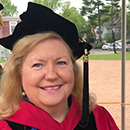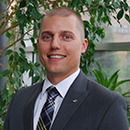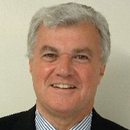Master of Science in Rehabilitation Science
The Master of Science in Rehabilitation Science (MS in RS) is a multidisciplinary program designed for health, wellness, and rehabilitation professionals interested in expanded roles in professional practice, and administration, through evidence-based practice. This is a fully online program with the exception of an 8-day residency. The residency provides hands-on training in accordance with a three-credit techniques in Manual Therapy course focusing on clinical skill acquisition and application. The proposed degree is intended to provide professionals opportunities to gain advance clinical techniques and skills together with the knowledge, skill, and ability to engage and produce discipline specific research (through the Rehabilitation Program Capstone).
Graduate and Professional Studies, in collaboration with the School of Health Sciences, has established the following goals and outcomes for the Master's in Rehabilitation Science degree. The program is structured to support students to achieve these goals and outcomes by the time they complete the program.
Goal 1: Mastery of the Field of Rehabilitation Science
1. Identify, analyze and interpret disciplinary concepts
2. Acquire and implement advanced skills and abilities in rehabilitation techniques.
3. Understand functional movement and the basis of dysfunctional movement
4. Identify psychosocial interventions in health, wellness and fitness
5. Acquire and apply leadership skills in a healthcare environment
6. Acquire and apply specialized manual therapy techniques
7. Assess, analyze, and interpret normal and abnormal human movement
8. Analyze, use, create and produce graduate level research
9. Synthesize and apply exercise prescription and therapeutic program design
10. Understand the theory and application of psychology of sport injury and rehabilitation
Goal 2: Clinical Reasoning
1. Incorporate evidence-based practice into clinical decision making to improve patient/client outcomes
2. Develop effective PICO questions for the purpose of engaging in evidence-based practice
Goal 3: Develop, Implement and Consume Evidence-based Research
1. Synthesize accurate explanations of information presented in statistical forms. Make appropriate inferences based on that information.
2. Consume and interpret quantitative/qualitative analysis of data as the basis for deep and thoughtful judgments, draw insightful, carefully qualified conclusions from this work.
3. Apply quantitative information in connection with the argument or purpose of the work, present it in an effective format, and explicate it with consistently high quality.
Goal 4: Develop and Practice Effective Communication Skills
1. Engages in effective situational patient and client interaction
2. Engage in effective communication utilizing appropriate written and oral strategies
| Course Code | Course Title | Credits |
|---|---|---|
| Core Courses | ||
| RSCI701 | Advance Kinesiology and Biomechanics | 3 |
| RSCI702 | Pathokinesiology | 3 |
| RSCI703 | Musculoskeletal Functional Assessment | 3 |
| RSCI706 | Rehabilitation Program Design for Human | 3 |
| RSCI780 | Quantitative & Qualitative Research | 3 |
| RSCI781 | Capstone | 3 |
Two Electives: 6 credits
Students may take any courses offered at the graduate level to fulfill their elective credits. View course options here.
RSCI701 - Advance Kinesiology and Biomechanics
The course involves a study of joint structure, joint function, and the biomechanical principles underlying the kinetics and kinematics of human motion, including normal gait and human movement. Emphasis is placed on the interaction between biomechanical and physiological factors in musculoskeletal and neuromuscular function, and the application of kinesiological principles to clinical rehabilitation practice.
RSCI702 - Pathokinesiology
The student will be introduced to a systematic evaluation approach based on the pathokinesiological model. The pathokinesiological model will examine human movement systems and it significance to regions of the human body. These regions will be recognized as potential sites for integrated pre-habilitation and rehabilitation exercise programs. Pre-requisite RSCI701
RSCI703 - Musculoskeletal Functional Assessment
The emphasis of this course is on the assessment of functional orthopedic conditions and musculoskeletal screening. The course emphasizes the application of systems analysis principles to clinical situations. The course goal is to improvethe clinician's ability to evaluate the patient's complaint as related to movement andidentify those patients who require additional orthopedic evaluation & referral whileassessing patient complaints in a logical deductive manner. Screening and assessment tools will be demonstrated as part of the process. In addition, the student is able to assess clinical scenarios as illustrated by relevant case studies.
RSCI705 - Evidence Based Rehabilitation
The purpose of this course is to increase student understanding of various rehabilitation issues facing America and the world today. This course focuses students toward the ever-changing contemporary issues that impact direct and indirect client care.
RSCI706 - Rehabilitation Program Design for Human
This course will introduce pre-habilitation and rehabilitation exercise strategies based on limit function and dysfunction. The student will receive detailed insight into the design of corrective exercise programs. The systematic approach of an integrated corrective exercise design uniquely blends the variables of available flexibility, isolated and integrated strengthening, and exercise design to provide the student with the necessary foundation in designing and developing safe prevention and corrective exercise programs. Pre-requisite RSCI703.
RSCI708 - Applied Nutrition Across the Lifespan
This course provides an in-depth exploration of contemporary issues nutrition for active individuals across the life span. Course topics will include: nutrition timing, caloric expenditure, performance enhancement dietary supplements, dietary lipids and heart disease, dietary fiber and health, and influence of life +style factors on nutrition. Controversies in nutrition, ergogenic aids and cultural aspects of food are also discussed. In addition, the course covers energy and nutrient needs for physical and athletic activities. Common myths and fallacies concerning diet and athletic performance as well as appropriate dietary approaches for specific activities and active people will be addressed.
RSCI709 - Concepts & Application of Manual Therapy
This hands-on course provides the theory and clinical application of current best practices in manual therapy techniques utilized in the treatment of orthopedic conditions that limit functional movement. The skills acquired in this course intend to produce any or all of the following effects: improve tissue extensibility; increase range of motion; mobilize soft tissues and joints; improve muscle function; modulate pain; and reduce soft tissue inflammation or restrictions in movement. A certification in a manual therapy technique will be acquired at the completion of the course. RSCI 709 is an on campus course scheduled during the required summer residency.
RSCI710X - Advanced Topics in Rehabilitation Scienc
The purpose of this course is to expand the student’s knowledge and skills related to the field of rehabilitation science through evidence-based research. In consultation with the course instructor, students will identify, and complete, a certification training course/workshop of interest. Additionally, students will complete various aspects of the research process, culminating in a research paper and professional presentation on the chosen topic.
RSCI715 - Advanced Pathophysiology
This course involves an in-depth evaluation of disease and injury processes across the lifespan and their relevance to therapeutic rehabilitation are presented. Attention is given to all major physiological systems and their significance in the rehabilitation sciences.
RSCI716 - Ethical Issues in Healthcare Professions
This course is a study of the application of ethical principles, which includes the legal factors and professional behavior, which impact patient management and the rights of the consumer in the provision of medical and rehabilitation services. Ethical issues explored include: human value development, decision making, basic principles of health care, the nature of rights, confidentiality and management of health care information, professional gate keeping as a function of role fidelity, autonomy and paternalism, and justice and the allocation of scarce resources.
RSCI780 - Quantitative & Qualitative Research
This course provides an overview of foundations of research design and the uses and interpretation of results. Content includes: reviewing the literature, developing research problems/questions; hypothesis testing, experimental, quasi-experimental and other research designs; and evaluating research studies as they relate to evidence-based practice in the health professions. The intended outcome is to familiarize students with the evidence-based guidelines associated to clinical outcomes and evidence-based practice.
RSCI781 - Capstone
Through the completion of a research project, on a topic within the field, this course serves as an essential outcome component to augment the professional development and new learning that occurs in didactic course work and demonstrates the ability of the graduate to make significant contributions to their professions. Pre-requisite: must be taken in final semester of program. Prerequisite: RSCI780

Cristina Haverty
Associate Vice President of Workforce Development and Global Engagement/ Professor, Athletic Training
Office: Alexander STC
Email: chaverty@lasell.edu

Lori Rosenthal
Assistant Provost; Professor of Psychology
Office: Plummer
Email: lrosenthal@lasell.edu

Janice Barrett
Professor of Communication; Chair, Graduate Communication Program
Office: Donahue 108
Email: jbarrett@lasell.edu

Keith Belmore
Associate Professor of Athletic Training and Graduate Chair of Athletic Training
Office: Alexander STC 104N
Email: KBelmore@lasell.edu

Linda Bucci
Professor & Program Chair of Justice Studies, Graduate Chair of Criminal Justice
Office: Plummer
Email: lbucci@lasell.edu

Sarah Giasullo
Assistant Professor of Athletic Training; Graduate Chair of Health Sciences
Office: Alexander STC 104T
Email: SGiasullo@lasell.edu

Janet Huetteman
Graduate Chair of Management and Marketing; Associate Professor of Marketing
Office: 23 Maple Street, Office #5
Email: JHuetteman@lasell.edu

Young-Tae Kim
Associate Professor of Sport Management; Graduate Interim Chair of Sport Management
Office: Alexandar STC
Email: ykim@lasell.edu

Ron Laham
Assistant Professor of Athletic Training/ Exercise Science
Office: Alexander STC
Email: RLaham@lasell.edu

Luis Lopez-Preciado
Associate Professor of Communication
Office: Donahue
Email: LLopez-Preciado@lasell.edu

Meryl Perlson
Chair of Communication; Professor of Communication
Office: Donahue 107
Email: mperlson@lasell.edu

Matthew Reilly
Chair of Business and Interim Chair of Sport Management; Assistant Professor of Business
Office: DeArment
Email: MReilly@lasell.edu

Claudia Rinaldi
The Joan Weiler Arnow ’49 Professor/Professor of Education, Chair of Education
Office: Brennan Library
Email: CRinaldi@lasell.edu

Daniel Sargeant
Associate Professor of Sport Management
Office: Alexander STC
Email: DSargeant@lasell.edu

Nancy Waldron
Assistant Provost; Professor of Entrepreneurship and Management
Office: DeArment
Email: nwaldron@lasell.edu

Brian Wardyga
Professor of Communication; General Manager, 109.2FM WLAS & LCTV
Office: Brennan Library, G04F
Email: bwardyga@lasell.edu
- Special Notice
- General Information
- Accreditation
- Main Campus: Newton, MA
- Hybrid/Online Canvas Learning Management System
- Professional Studies
- Academic Advising & Student Services
- Academic Technology
- Brennan Library
- Disability Services
- Fitness Centers
- 2021-2022 Tuition and Fees
- Health Insurance
- Student Account with a Credit Balance
- Refund Via Direct Deposit
- Dropping Courses, Withdrawing from a Course, or Withdrawing from the University
- Academic Policies 21-22
- Admission to Graduate Studies 21-22
- Graduate Financial Information 21-22
-
Programs of Study
- Bachelor Completion in Communications
- Bachelor Completion in Psychology
- Master of Science in Organizational Leadership
- Course Descriptions 21-22
- Master of Science in Applied Sports Science Analytics 21-22
- Bachelor Degree Completion Program 21-22
- Master of Science in Human Resources 21-22
- Master of Education 21-22
- Master of Science in Marketing 21-22
- Master of Science in Communication 21-22
- Master of Science in Criminal Justice 21-22
- Master of Science in Management 21-22
- Master of Science in Nutrition for Human Performance 21-22
- Master of Science in Athletic Training 21-22
- Master of Science in Project Management 21-22
- Master of Science in Sport Management 21-22
- MBA 21-22
- Master of Science in Integrated Marketing Communication 21-22
- Master of Science in Rehabilitation Science 21-22
- Graduate Certificates





